2024 Bathurst 1000: All you need to know about world's craziest race
The 2024 Bathurst is set to be one of the great event's best yet – get up to speed on a race featuring 26 monstrous V8 Supercars
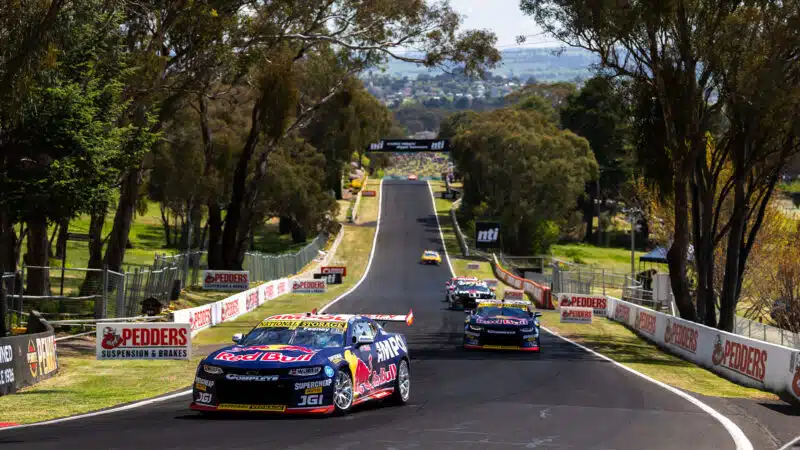
Cars barrel up Mount Panorama
Getty Images
We might be one week away from the return of F1, but there are still thrills to be had elsewhere in the motor sport world: this weekend sees the 64th running of the Bathurst 1000, one of the wildest contests in racing.
In a climate of ever-increasing hybrid and electric competition, you can always rely on the Aussies to keep things ‘old school’: 26 snarling V8 supercar beasts, each pumping out 500bhp, will roar up Mount Panorama at 11:30am AEDT (1.30am GMT) this Sunday for the start of the 1000-kilometre race, starting what is for many the world’s greatest tin-top contest out there.
The race represents Round 10 of the fiercely contested V8 Supercars Championship, with a field made up from 16 Chevrolet Camaros and 10 Ford Mustangs. Unlike the other shorter events in the series, each car is shared by two drivers, the race normally taking six to seven hours.
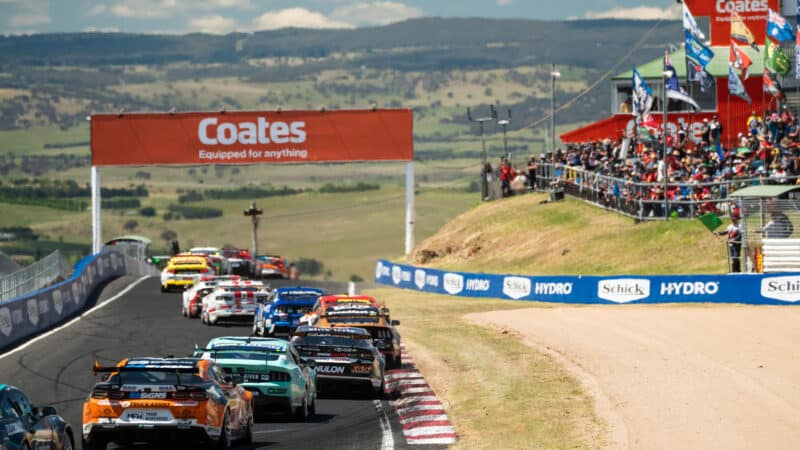
26 cars make up the Bathurst 1000 field
Getty Images
They’ll be doing so at Mount Panorama – more commonly referred to as Bathurst – widely regarded as one of the greatest challenges in motor sport.
That equates to 161 laps of the 6.2km circuit which winds its way up and over the rugged New South Wales scenery. The middle section of the track is fast, tight and unforgiving all at the same time. With barriers lining the very edge of the track (and the odd kangaroo), no mistake goes unpunished. It’s one of the greatest challenges in racing.
The cars then roar down the Conrod straight towards The Chase and then Murray’s Corner, before entering the first turn – aptly named Hell – once more. Competitors will do the formidable lap 161 times in total.
It’s a racing spectacle not to be missed – here’s all you need to know about the Bathurst 1000.
How does the Bathurst 1000 work?
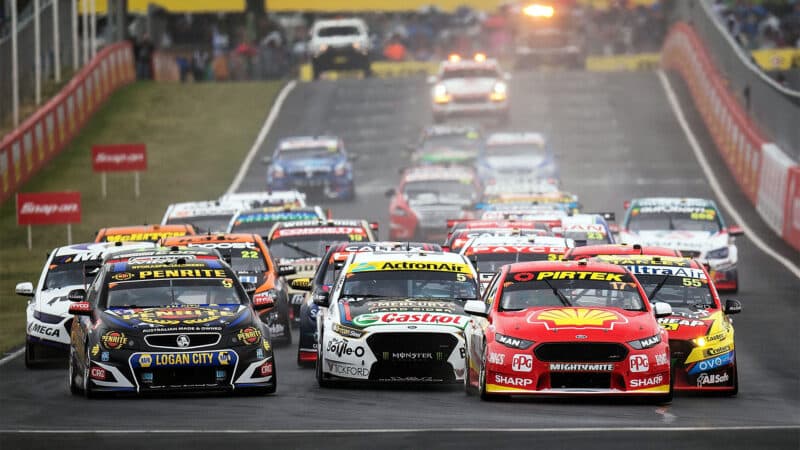
Flying into ‘Hell’
Getty Images
The Bathurst 1000 is a 1000km, 161-lap race around the 6.2km Mount Panorama circuit, and is Round 10 of Australia’s premier racing championship, the V8 Supercars series.
26 cars – with two drivers per car – take on the event, it being one of two endurance races on the Supercars calendar, the other being the Sandown 500 last month.
Two hour-long practice sessions on Thursday October 10 are followed by another race on the Friday, before a qualifying session sets the grid from 26th to 11th, with the top 10 cars going into a qualifying shootout to decide pole position on the Saturday afternoon.
A 20-minute warm-up on Sunday morning is followed by the race at 11:30am Australian Eastern Daylight Time.
Quick pit stop timing, tyre choice and fuel strategy are crucial to the gruelling, six-plus-hour race – drivers often try to stretch tyres and fuel to miss a stop at the end, often leading to nail-biting finishes.
Red Bull Racing’s Scott Brown currently heads the championship by 189 points, the Chevrolet driver also winning at the other endurance event at Sandown this season with co-driver Scott Pye. Leading Walkinshaw Andretti United’s Chaz Mostert (co-driving with Lee Holdsworth) and Red Bull team-mate Broce Feeney (Jamie Whincup) in the title race, he’s a clear favourite to prevail this weekend too.
Mostert is a former winner also though, as are veterans Craig Lowndes and Richie Stanaway, who have seven and five Bathurst wins apiece respectively. Previous pole-sitters Brad Kostecki and Cam Waters will also be contenders.
How to watch the Bathurst 1000 – session times
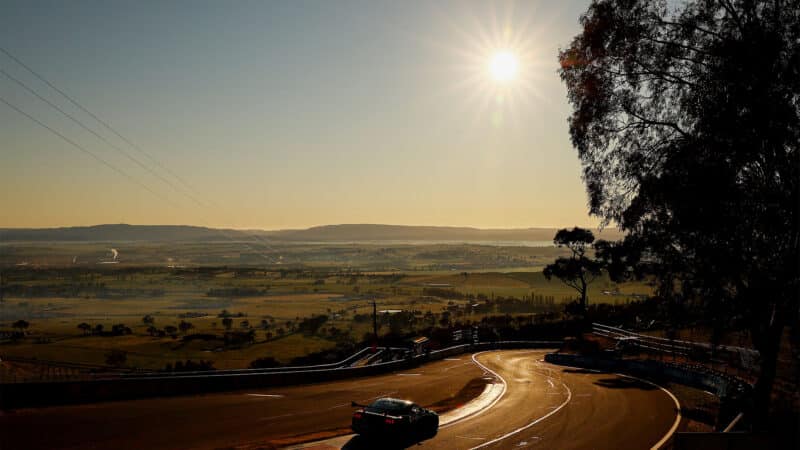
Beautiful scenery – and unforgiving barriers
Getty Images
If you live in Australia, you’ll be able to watch the Bathurst 1000 on ABC’s free-to-air station Channel Seven as well as its 7plus app.
It will also be available to view on the pay-per-view Foxtel channel in Australia.
For viewers in Europe, you can watch the action either on the series own streaming service Superview, or the championship’s subscription feature on its YouTube channel.
A monthly pass costs $9.99 (£5.15), while a yearly subscription is $99 (£51.03).
Here are the session times for across the weekend – all times GMT.
| Date | Session | |
| Thursday October 10 – 3.20am | Practice 1 (60min – all drivers) | |
| Thursday October 10 – 6.55am | Practice 2 (60min – co-drivers only) | |
| Friday October 11 – 00.05am | Practice 3 (60min – all drivers) | |
| Friday October 11 – 3.05am | Practice 4 (60min – all drivers) | |
| Friday October 11 – 6.15am | Qualifying (60min) | |
| Saturday October 12 – 00.05am | Practice 5 (60min – co-drivers only) | |
| Saturday October 12 – 3.10am | Practice 6 (60min – all drivers) | |
| Saturday October 12 – 7.05am | Top 10 qualifying shootout (45min) | |
| Saturday October 13 – 10.15pm | Warm-up (20min) | |
| Sunday October 13 – 1.30am | Bathurst 1000 (161 laps) |
Entry list – who’s in the Bathhurst 1000?
| Car number | Drivers | Team | Car |
| 1 | Brodie Kostecki Todd Hazelwood |
Erebus Motorsport | Chevrolet Camaro Mk.6 |
| 2 | Ryan Wood Fabian Coulthard |
Walkinshaw Andretti United | Ford Mustang S650 |
| 3 | Aaron Love Aaron Cameron |
Blanchard Racing Team | Ford Mustang S650 |
| 4 | Cameron Hill Cameron Crick |
Matt Stone Racing | Chevrolet Camaro Mk.6 |
| 6 | Cameron Waters James Moffat |
Tickford Racing | Ford Mustang S650 |
| 7 | James Courtney Jack Perkins |
Blanchard Racing Team | Ford Mustang S650 |
| 8 | Andre Heimgartner Declan Fraser |
Brad Jones Racing | Chevrolet Camaro Mk.6 |
| 9 | Jack Le Brocq Jayden Ojeda |
Erebus Motorsport | Chevrolet Camaro Mk.6 |
| 10 | Nick Percat Dylan O’Keeffe |
Matt Stone Racing | Chevrolet Camaro Mk.6 |
| 11 | Anton de Pasquale Tony D’Alberto |
Dick Johnson Racing | Ford Mustang S650 |
| 14 | Bryce Fullwood Jaylyn Robotham |
Brad Jones Racing | Chevrolet Camaro Mk.6 |
| 17 | Will Davison Kai Allen |
Dick Johnson Racing | Ford Mustang S650 |
| 18 | Mark Winterbottom Michael Caruso |
Team 18 | Chevrolet Camaro Mk.6 |
| 19 | Matthew Payne Garth Tander |
Grove Racing | Ford Mustang S650 |
| 20 | David Reynolds Warren Luff |
Team 18 | Chevrolet Camaro Mk.6 |
| 23 | Tim Slade Cameron McLeod |
PremiAir Racing | Chevrolet Camaro Mk.6 |
| 25 | Chaz Mostert Lee Holdsworth |
Walkinshaw Andretti United | Ford Mustang S650 |
| 26 | Richie Stanaway Dale Wood |
Grove Racing | Ford Mustang S650 |
| 31 | James Golding David Russell |
PremiAir Racing | Chevrolet Camaro Mk.6 |
| 50 | Jaxon Evans Dean Fiore |
Brad Jones Racing | Chevrolet Camaro Mk.6 |
| 55 | Thomas Randle Tyler Everingham |
Tickford Racing | Ford Mustang S650 |
| 87 | Will Brown Scott Pye |
Triple Eight Race Engineering | Chevrolet Camaro Mk.6 |
| 88 | Broc Feeney Jamie Whincup |
Triple Eight Race Engineering | Chevrolet Camaro Mk.6 |
| 96 | Macauley Jones Jordan Boys |
Brad Jones Racing | Chevrolet Camaro Mk.6 |
| 118 | Matt Chahda Bradley Vaughan |
Matt Chahda Racing | Chevrolet Camaro Mk.6 |
| 888 | Cooper Murray Craig Lowndes |
Triple Eight Race Engineering | Chevrolet Camaro Mk.6 |
The Bathurst 1000: a brief history
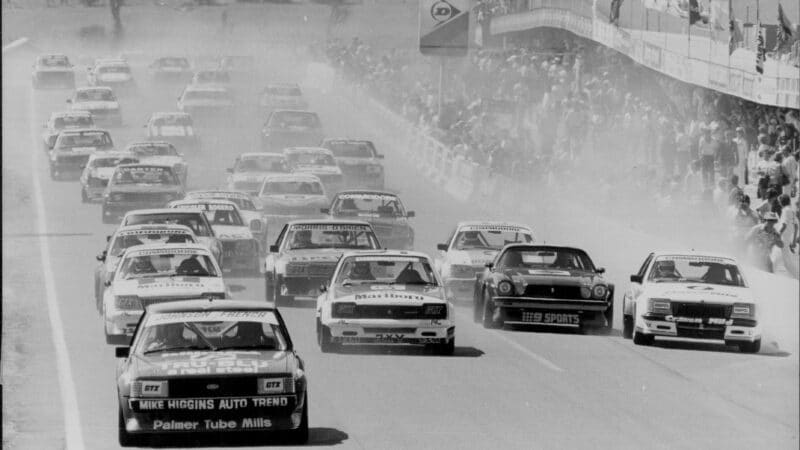
1980 race gets underway
Getty Images
The inaugural running of the Bathurst 1000 was on November 20 1960 at the Phillip Island circuit.
Originally called the Armstrong 500 – being sponsored by an automotive parts manufacturer – the race was formerly a 500-mile contest in which competitors were not allowed to pit for the first 100 miles. Frank Coad and John Roxburgh were the first ever winners, driving a Vauxhall Cresta.
After being held twice more at Phillip Island, the race moved to Mount Panorama (Bathurst) for 1963. Entrants’ cars were gradually tuned and beefed up over time, with 1965 winners Bo Seton and Midge Bosworth the first to clinch victory in a Bathurst-bespoke Cortina GT 500 ‘special’.
The popularity of the race also took off during the 1960s. Australian manufacturers began to enter in response to the growing public interest. A Holden – Ford – Chrysler rivalry was forged during this period, with the latter two marques still fighting it out to this day.
Australian touring car legend Peter Brock entered his first race in 1969, the Victoria native still holding the record win holder with nine victories.
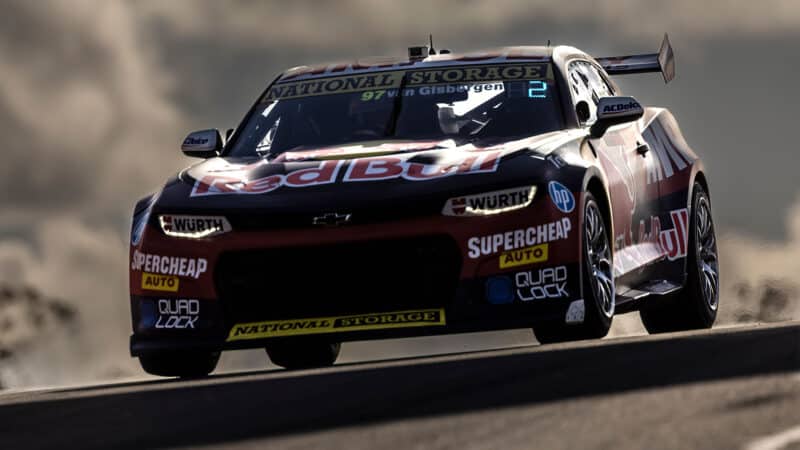
Shane van Gisbergen is most recent winner – but he won’t be there to defend his title in 2024
Red Bull
1972 was the last year drivers were permitted to compete without co-drivers, and the following year the race was extended from 500 miles to 1000 kilometres. Brock would win his first Bathurst that year, before claiming a pair of hat-tricks from 1978-1980 and 1982 to 1984 as well as three more in 1972, 1975 and 1987.
From 1985 Bathurst 1000 was run to Group A rules. That year’s race was dominated by Tom Walkinshaw Racing’s Jaguar XJ-S team, the marque’s only win at Mount Panorama.
1986 saw the race’s first fatality, when his car hit the concrete base of the Conrod Straight bridge over at 160mph. Six other driver deaths have been recorded at the circuit, the only none-racing death being 1967 F1 champ Denny Hulme, who suffered a heart attack during the 1992 event.
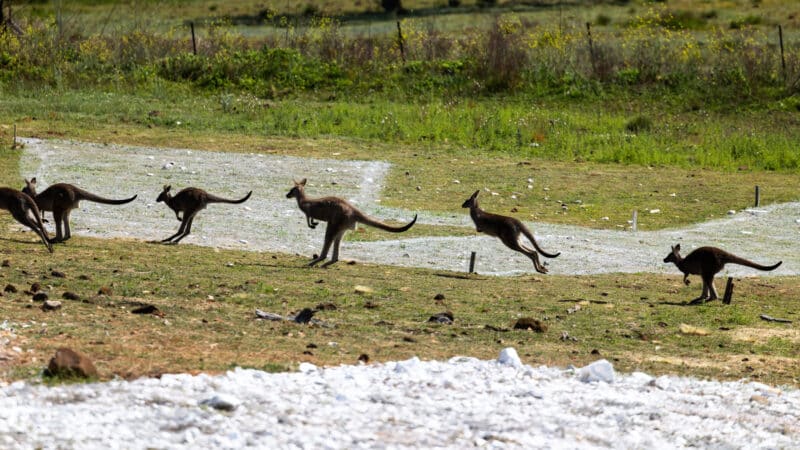
‘Watch out for Skippy’ etc
Getty Images
From 1999, the current V8 formula took over, evolving into the race we know today.
Craig Lowndes has won seven races since 1996, making him the most successful driver of the modern era, while the more recent dominant driver has been Shan van Gisbergen.
The New Zealander has won the race three times and is the reigning champion, but will be absent this year as he embarks on a career in NASCAR.
